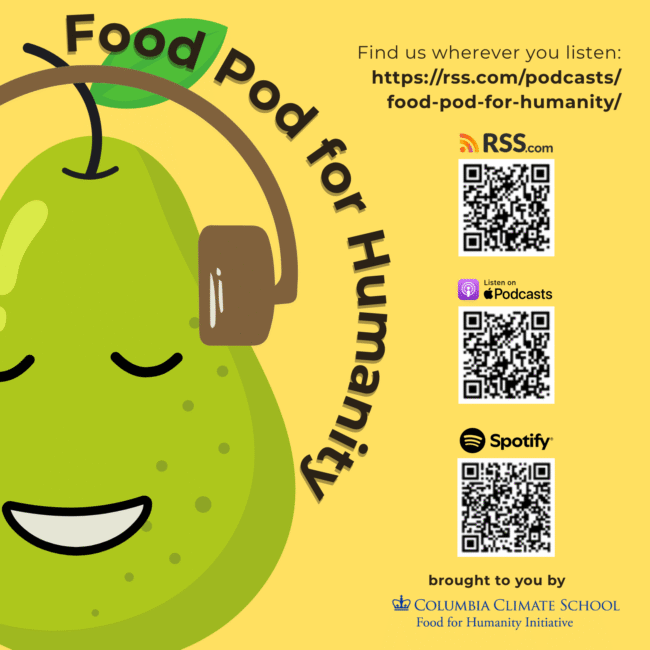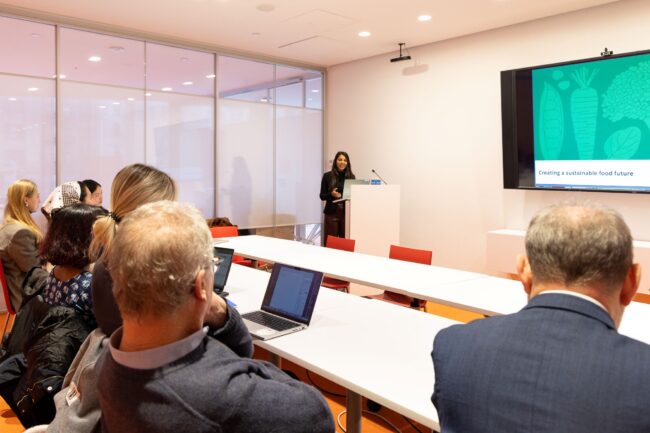The Food Pod for Humanity podcast, produced by the Columbia Climate School’s Food for Humanity Initiative, explores how we can transform food systems for a more sustainable future.
“Food systems alone can take us past these dangerous thresholds of global warming,” environmental scientist and New York University professor Matthew Hayek said in the season two premiere of the Food Pod for Humanity podcast.

“One-quarter to one-third of all greenhouse gas emissions on Earth come from the food system,” Hayek said. Animal agriculture alone accounts for 12 to 20% of those emissions.
Following the first podcast season focused on food waste in New York City, hosts Jochebed Louis-Jean and Dannie Dinh, from the Columbia Climate School, set out this season to examine why animal agriculture has such a big impact on climate change and explore solutions like plant-based diets and alternative proteins. Through conversations with scientists, policymakers and entrepreneurs, season two digs into how animal-based food systems can be transformed both sustainably and equitably.
In the season premiere, Hayek, Louis-Jean and Dinh are also joined by food systems scientist and Cornell University professor Mario Herrero to lay the groundwork for the “why.” In other words, why are food systems, and specifically animal agriculture, so harmful to the environment? Why does this problem need to be solved? And why is now, not later, the time to do something about it?
“Animal agriculture, it’s a very large sector…It produces a lot of highly nutritious food. It employs people and it gives livelihoods to farmers, to many women, especially in low and middle-income countries,” Herrero said. “But in the process of doing so, it generates a significant environmental footprint.”
There are two key reasons for this footprint, Herrero and Hayek said. First, it takes vast amounts of land to raise animals, and second, those animals undergo digestive processes that release huge amounts of methane—one of the most potent greenhouse gases—into the atmosphere.
In addition to harming planetary health, unbalanced diets with excessive consumption of animal-based foods may also lead to concerning public health outcomes in some parts of the world, Francesco Branca—who previously served as director of the Department of Nutrition for Health and Development in the World Health Organization and currently teaches at the University of Geneva—pointed out in episode two.
High levels of red meat and processed meats in particular have been associated with cardiovascular disease and cancer, Branca explained.
Consumption levels vary widely across the world, typically rising with income. In the United States, consumers eat twice the recommended amount of beef and pork, while consumption remains limited, and likely insufficient, in Africa and Southeast Asia.
“I think it’s fair to assume that the consumption in the United States of red meats is not only too high and unnecessary, but probably harming human health, let alone, of course, the consequences on the use of planetary resources,” Branca said.
Policymakers have a key role to play, Branca said, in driving a decline in the consumption of animal-based foods where too much is currently consumed.
Neeti Jain, the former strategic partnerships advisor at the New York City Mayor’s Office of Food Policy, also joined episode two to discuss how New York City is approaching this challenge with local-level policy levers.

Food, she noted, is the third largest contributor to New York City’s carbon footprint, after buildings and transportation. This realization prompted the city to commit to reducing food-based emissions from government activities by 33% by 2030.
“When I say government activities, I mean all of the places where New York City government serves food. So that’s in our public hospitals, in our public schools, correctional facilities, older adult centers and shelters,” Jain said. “We purchase about $500 million worth of food a year. So we are able to use that procurement and those dollars to essentially move forward our climate, health and nutrition goals by thinking about how we can change what we put on our plates.”
Ruminant animal products—including meat from beef, sheep, lamb and goats, as well as dairy—are the highest emitters within the city’s food system, she said.
That’s why the city launched the Plant-Powered Carbon Challenge, a collaborative initiative between the Mayor’s office and private-sector entities like hospitals, universities, sports venues and more to work toward lowering their food-based emissions.
Eighteen organizations have already signed onto the Plant-Powered Carbon Challenge, including Columbia University—the first-ever signatory—the Bronx Zoo, the New York Botanical Garden and JP Morgan Chase.
Mount Sinai Health System is another signatory of the challenge, which Jain said is as much aligned with the city’s climate goals as it is with the hospital’s public health goals. Plant-based diets are often “already built into [patients’] treatment plans,” she said. “Adding this kind of climate commitment is very much part and parcel of that form of food as medicine.”
Jain also explained how the city is using choice architecture like “nudges” to sway consumers away from animal-based options.
“We definitely don’t want to tell people what to eat or how to eat, but we know that we can kind of encourage and guide people to make more sustainable choices that are also delicious, nutritious, comforting and flavorful,” Jain said.
As policymakers work to make change at the institutional level, one company is working to shift consumer behavior on the ground, inside the bodegas that are so core to New York City’s food landscape. Nil Zacharias joined episode three to talk about how his company Plantega is bringing plant-based deli classics to the beloved corner stores in all five boroughs.
“Our mission is really to try to make plant-based food easier to access everywhere. And the way we do that is we offer a turnkey solution that empowers New York City’s bodegas or corner stores to carry Plantega’s 100% plant-based menu that features deli classics like the chopped cheese, the bacon-egg-and-cheese and sausage-egg-and-cheese,” Zacharias said.
He explained that they aim to reach unlikely customers by making it easy for them to pick healthier and more sustainable options, and to add value for bodegas that can sell Plantega’s products at a higher margin than regular deli items.
“If you can take one specific kind of food that is so iconic, so dear to New Yorkers, and you bring in plant-based options, not in a way that feels like it is taking away from the culture, but is actually adding to it, it is actually empowering the store owners. And then it’s also giving customers the freedom of choice,” Zacharias said.
Tune in this Tuesday, August 5, for Episode 4, featuring an interview with Gabe Huertas del Pino on the novel proteins that his company, Archway Pet, is sourcing to feed our furry friends. From insects to invasive fish species, he’s shining a light on sustainable and healthy—yet often overlooked—options for pet food.
Listen now to Season 2’s released episodes on Spotify, Apple Podcasts, Pandora, or wherever you get your podcasts, and every other Tuesday for the rest of Season 2. Check out all episodes of Season 1 to learn about the impacts and solutions to food waste in New York City.


